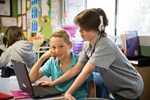
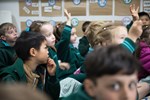
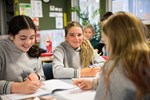
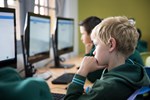
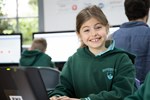
Primary Years Programme
Lloyd Street School was authorised as an International Baccalaureate, Primary Years Programme, school in 2007. The Primary Years Programme (PYP) is a curriculum framework for international primary education.
In the PYP, a balance is sought between the acquisition of essential knowledge and skills, the development of conceptual understandings, the demonstration of positive attitudes, and the taking of responsible action.
In terms of achieving this balance, the five essential elements of the written curriculum are emphasized.
Knowledge - Significant, relevant content that we wish the students to explore and know about, taking into consideration their prior experience and understanding.
Concepts- Powerful ideas that have relevance within the subject areas but also transcend them and that students must explore and re-explore in order to develop a coherent, in-depth understanding.
Approaches to Learning (ATLs) - The Attitudes to Learning develop transferable cognitive and metacognitive skills. The ATLs help students learn how to learn and become self-regulated, active and agentic learners.
Learner Profile - The Learner Profile describes the internationally minded people the IB programmes aim to develop. Internationally minded people who recognise their common humanity and shared guardianship of the planet, help to create a better and more peaceful world.
Action - Demonstrations of deeper learning in responsible behaviour through responsible action; a manifestation in practice of the other essential elements.
The PYP is academically rigorous and transdisciplinary in nature, with all students completing six inquiries per year. This includes one inquiry addressing each PYP transdisplinary theme.
|
Who we are |
|
An inquiry into the nature of the self; beliefs and values; personal, physical, mental, social and spiritual health; human relationships including families, friends, communities, and cultures; rights and responsibilities; what it means to be human. |
|
Where we are in place and time |
|
An inquiry into orientation in place and time; personal histories; homes and journeys; the discoveries, explorations and migrations of humankind; the relationships between and the interconnectedness of individuals and civilizations, from local and global perspectives. |
|
How we express ourselves |
|
An inquiry into the ways in which we discover and express ideas, feelings, nature, culture, beliefs and values; the ways in which we reflect on, extend and enjoy our creativity; our appreciation of the aesthetic. |
|
How the world works |
|
An inquiry into the natural world and its laws; the interaction between the natural world (physical and biological) and human societies; how humans use their understanding of scientific principles; the impact of scientific and technological advances on society and on the environment. |
|
How we organise ourselves |
|
An inquiry into the interconnectedness of human-made systems and communities; the structure and function of organizations; societal decision-making; economic activities and their impact on humankind and the environment. |
|
Sharing the planet |
|
An inquiry into rights and responsibilities in the struggle to share finite resources with other people and with other living things; communities and the relationships within and between them; access to equal opportunities; peace and conflict resolution. |
The aim of all IB programmes is to develop internationally minded people who, recognizing their common humanity and shared guardianship of the planet, help to create a better and more peaceful world. IB learners strive to demonstrate the attributes of the Learner Profile.
IB Learner Profile
Inquirers
We nurture our curiosity, developing skills for inquiry and research. We know how to learn independently and with others. We learn with enthusiasm and sustain our love of learning throughout life.
Knowledgeable
We develop and use conceptual understanding, exploring knowledge across a range of disciplines. We engage with issues and ideas that have local and global signifi cance.
Thinkers
We use critical and creative thinking skills to analyse and take responsible action on complex problems. We exercise initiative in making reasoned, ethical decisions.
Communicators
We express ourselves con fidently and creatively in more than one language and in many ways. We collaborate eff ectively, listening carefully to the perspectives of other individuals and groups.
Principled
We act with integrity and honesty, with a strong sense of fairness and justice, and with respect for the dignity and rights of people everywhere. We take responsibility for our actions and their consequences.
Open-minded
We critically appreciate our own cultures and personal histories, as well as the values and traditions of others. We seek and evaluate a range of points of view, and we are willing to grow from the experience.
Caring
We show empathy, compassion and respect. We have a commitment to service, and we act to make a positive diff erence in the lives of others and in the world around us.
Courageous
We approach uncertainty with forethought and determination; we work independently and cooperatively to explore new ideas and innovative strategies. We are resourceful and resilient in the face of challenges and change.
Balanced
We understand the importance of balancing di erent aspects of our lives - intellectual, physical, and emotional to achieve well-being for ourselves and others. We recognize our inter-dependence with other people and with the world in which we live.
Reflective
We thoughtfully consider the world and our own ideas and experience. We work to understand our strengths and weaknesses in order to support our learning and personal development.
For further information about the IB Primary Years Programme please visit the International Baccalaureate website.






